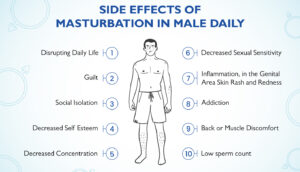How Often Should a Male Masturbate? Exploring Myths and Facts:
It is normal and common for guys of all ages to masturbate. Many men question, “How often should a male masturbate?” despite the fact that it can be a source of pleasure and stress reduction. Because the answer varies based on a wide range of circumstances, such as personal tastes, lifestyle, and individual health, the question is complicated. Regrettably, myths, misunderstandings, and stigma have frequently tainted this subject in society, making it challenging to determine what is actually “normal.”
This blog article will discuss common issues, dispel misunderstandings about male masturbation, and offer practical advice on how frequently a man should masturbate for the best possible physical and emotional health.

The Basics of Masturbation
It’s important to comprehend what masturbation is and why it’s a common and healthy pastime before answering the frequency question. The act of stimulating one’s own genitalia for sexual pleasure is known as masturbation. It is a typical aspect of sexual development that many men experience throughout their lives, usually starting in adolescence.
Numerous studies have been conducted on masturbation, and the results show that it can have a number of psychological and physical advantages, including: Stress reduction: Endorphins, which are substances in the brain that help lower stress and foster feelings of wellbeing, are released during masturbation.
Better sleep: Because dopamine and oxytocin are released when men masturbate, many men report feeling calmer and having a higher chance of falling asleep.
Prostate health: According to certain research, regular masturbation-based ejaculation may lower the risk of prostate cancer by removing old sperm and minimizing the accumulation of toxic chemicals in the prostate.
Improved mood:
By releasing dopamine, the “feel-good” neurotransmitter, masturbation can also improve mood and, in certain cases, even lessen depressive symptoms.
Sexual health:
Men can explore their sexual preferences through regular masturbation, which can improve sexual communication and relationship pleasure.

After learning about the health advantages of masturbation, let’s examine how frequently it occurs.
How Often Is It Appropriate for Men to Masturbate?
The subject of how frequently a male should masturbate has no universally applicable solution. A number of variables influence the optimal frequency, including:
>Age:
Due to greater testosterone levels, younger men—particularly those in their teens and early twenties—may feel the urge to masturbate more strongly. Although this isn’t always the case, guys tend to masturbate less frequently as they become older.
>Health:
The frequency of masturbations can be significantly influenced by both mental and physical health. Males may engage in more frequent masturbation as a coping mechanism for stress, worry, or despair. However, men who are physically ill or recuperating from surgery could be less inclined to masturbate.
>Relationship status:
Because of their partner’s sexual activities, men in committed relationships may discover that they masturbate less frequently. Nonetheless, it’s quite acceptable for some guys to continue masturbating for their own gratification while in a relationship.
>Personal preference:
In the end, it is up to the individual how often they masturbate. While some guys may masturbate once a month, others may do it multiple times a week. What matters is that the person is content and at ease with their own routines.
The Myths Regarding the Frequency of Male Masturbation
There have been a lot of fallacies surrounding masturbation over the years, particularly regarding how frequently it occurs. Let’s examine some of these misconceptions in more detail and distinguish fact from fiction.
Myth 1: There are health risks associated with masturbation.
The idea that masturbation is bad for your health is one of the most widespread misconceptions about it. There is no truth to this at all. For the majority of guys, masturbation is a harmless and good aspect of life. As was already noted, it offers a number of advantages, such as less stress, better sleep, and elevated mood. But excessive masturbation, which is defined as masturbation that disrupts relationships, employment, or daily life, may become troublesome. It could be worthwhile to consult a healthcare provider if masturbation starts to feel obsessive or gets in the way of other facets of life.
Myth 2: Excessive masturbation might cause erectile problems.
This is yet another widespread misunderstanding. Actually, there is no proof that erectile dysfunction (ED) is brought on by regular masturbation. Usually, underlying medical disorders like diabetes, heart disease, or psychological issues like stress or worry are connected to eating disorders. However, after masturbating frequently, some men may have short-term issues with arousal or performance, particularly if they are masturbating excessively or in a highly exciting manner. This is typically transient and can be fixed by merely stopping masturbating or changing one’s sexual behavior.

Myth 3: Your testosterone levels will drop when you masturbate.
Many men worry that masturbating may cause their testosterone levels to drop, which will result in less muscular mass, energy, and vitality. Nevertheless, there isn’t any solid proof that masturbating significantly affects testosterone levels over the long run. After ejaculation, testosterone levels may momentarily decline, but they soon rebound to normal. Your libido and total testosterone levels are unaffected by frequent masturbation.
Myth 4: Infertility can result from masturbation.
The idea that masturbation causes infertility is another misconception. Masturbation generally has no effect on a man’s fertility, while extreme masturbation that causes harm to the reproductive organs is improbable. By removing old sperm and guaranteeing healthy sperm production, regular ejaculation (via masturbation or sexual contact) may really aid to improve sperm quality.
What Does “Normal” Frequency Mean?
In actuality, there is no “normal” amount of time that a man should spend masturbating. The frequency is influenced by a variety of factors, and what one person considers typical may not be so for another. However, research has shown that:
> Between 50 and 70 percent of men say they masturbate at least once a week.
> While older males may engage in less regular masturbation, younger men are more likely to do so, frequently multiple times per week.
> While two to four times a week may be a healthy range, some men may be able to avoid the temptation to masturbate for longer periods of time, while others may choose to do so more frequently.
In the end, if you are happy with your sexual health and well-being is more important than how frequently you masturbate.
At what point should you worry about masturbation?
Even though masturbation is usually safe, there are situations in which it might be reason for alarm. The following are indicators that you may wish to reconsider your routines or get expert assistance:
> Masturbation disrupts day-to-day activities. It could be time to cut back on masturbation if you discover that it’s taking up too much time and getting in the way of relationships, job, or other important activities.
> You experience guilt or humiliation. Masturbation may indicate underlying psychological problems like anxiety or compulsive behavior if it is accompanied by feelings of guilt or shame, particularly if you are unable to control your cravings.
> The ache in the body. Excessive or violent masturbation can cause physical discomfort, soreness, or harm. Resting and letting your body heal are crucial if you’re in pain.
Conclusion, finding what works for you
The frequency of a man’s masturbation ultimately relies on him. Finding a balance that works for you is crucial because it’s a very personal activity. It’s crucial to keep in mind that masturbation is neither good nor harmful in and of itself; it all depends on moderation and how it impacts your general health and wellbeing. This is true whether you choose to masturbate regularly or infrequently.
Never be afraid to talk to a therapist or healthcare professional if you ever feel that masturbation is affecting your life or giving you distress. Getting help and learning more about your sexual health is not a sign of weakness.
In conclusion, there is no easy way to answer the question, “How often should a male masturbate?” The most crucial things are to pay attention to your body, keep a good outlook about sexuality, and make sure your habits support your physical and emotional well.